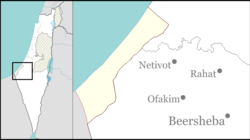This is an old revision of this page, as edited by Sean.hoyland (talk | contribs) at 19:11, 12 November 2011 (→External links: fix broken amnesty link for now. convert to inline cite later). The present address (URL) is a permanent link to this revision, which may differ significantly from the current revision.
Revision as of 19:11, 12 November 2011 by Sean.hoyland (talk | contribs) (→External links: fix broken amnesty link for now. convert to inline cite later)(diff) ← Previous revision | Latest revision (diff) | Newer revision → (diff)| Murder of Tali Hatuel and her four daughters | |
|---|---|
| Part of the Second Intifada militancy campaign | |

| |
| Location | Kissufim Crossing |
| Coordinates | 31°22′40.93″N 34°21′27.22″E / 31.3780361°N 34.3575611°E / 31.3780361; 34.3575611 |
| Date | May 2, 2004 |
| Attack type | Shooting attack |
| Weapons | AK-47 rifles |
| Deaths | An 8 months pregnant woman and her 4 children (+ 2 attackers) |
| Perpetrator | Two assailants (Ibrahim Hammad and Faisal Abu Maj'ra). The Islamic Jihad and the Popular Resistance Committees claimed responsibility |
The murder of Tali Hatuel and her four daughters was a shooting attack which occurred on May 2, 2004, in which Palestinian militants killed five members of the Hatuel family in Gush Katif. Tali Hatuel, an Israeli resident who resided in Gush Katif, was eight months pregnant and was murdered along with four of her daughters: Hila (11), Hadar (9), Roni (7) and Merav (2). After shooting at the vehicle in which Hatuel was driving with her daughters, the militants approached the vehicle and shot the occupants at close range to make sure they were all dead.
The attack, which shocked the Israeli public, was classified by the Amnesty International organization as a crime against humanity.
Background
In 1992 David and Tali Hatuel settled in the Israeli settlement Katif located in the Gush Katif bloc of Israeli settlements in the Gaza Strip. Tali was a social worker and David was a principal at an Elementary School in Ashkelon. Tali was eight months pregnant, and was looking forward to the birth of her first son.
The attack
On Sunday, May 2, 2004, Hatuel picked up her four daughters from school and drove in the family Citroen station wagon, together with the children, towards her husband's workplace in Ashkelon to campaign against Israel's unilateral disengagement plan. While traveling in the vicinity of the Kissufim Crossing two armed Palestinian militants, whom prepared an ambush from apartment buildings located nearby the highway, opened fire at the car and managed to hit Hatual and force her off the road. Hatuel was seriously injured in the initial part of the attack. The attackers, who were armed with AK-47 rifles, approached the vehicle and fired their weapons from close range at Tali Hatuel and her daughters until they were all dead.
IDF forces whom were dispatched to the area soon afterwards managed to kill the attackers during a battle. During the battle with the attackers two IDF soldiers and one civilian were injured.
The Popular Resistance Committees and Islamic Jihad claimed responsibility for the attack.
Fatalities
|
|
Aftermath
Related attacks
On May 9, 2004, a week after the attack, two gunmen dressed in women's clothing opened fire upon participants at a memorial service for Tali Hatuel and her daughters. There were no civilian injuries. The attackers were killed by the Israel Defense Force. An alliance of Islamic Jihad and the Popular Resistance Committees claimed responsibility for the attack.
The following day, on May 10, 2004, the Israel Defense Force demolished some of the houses that had reportedly provided cover for the attack on Tali Hatuel and her daughters, and for the attack on the mourners at the memorial service.
2007 arrest
On June 6, 2007, the IDF arrested Jihad Salah Saliman Abu Dahar, a Palestinian member of Islamic Jihad, who admitted to his involvement in a number of acts of violence, including the attack on Tali Hatuel and her daughters.
Tributes
The funeral, held the same day as the attack, was attended by Moshe Katsav, the President of Israel at the time.
On June 16, 2004, Ben-Gurion University in the Negev awarded Tali Hatuel a posthumous Masters of Arts degree in Social Work. Her husband, David Hatuel, accepted the degree on her behalf.
On July 25, 2004, Tali's husband David Hatuel was given a place of prominence near the Western Wall in the human chain from the Gaza Strip to Jerusalem protesting against Israel's withdrawal from Gaza in which over 130,000 Israelis took part.
References
- "20 of 21 Gaza Settlements Evacuated". Washington Post. Retrieved June 30, 2008.
- ^ http://www.mfa.gov.il/MFA/Terrorism-+Obstacle+to+Peace/Memorial/2004/Tali%20Hatuel. Retrieved November 10, 2011.
{{cite web}}:|url=missing title (help) - http://www.israelnn.com/news.php3?id=62175. Retrieved November 10, 2011.
{{cite news}}:|url=missing title (help) - .
- "Israeli Forces Kill Gunmen". New York Times. May 10, 2004. Retrieved June 30, 2008.
- ^ "Gunmen kill Jewish settler family". London: BBC News. May 3, 2004. Retrieved June 30, 2008.
- "Terrorist involved in 2004 murder of Hatuel family arrested 16-Jul-2007". www.mfa.gov.il. Retrieved June 30, 2008.
- "Gazan indicted over 2004 terror attack that killed pregnant mother, daughters". Haaretz. Retrieved June 30, 2008.
External links
- Murder of Tali Hatuel and her four daughters – published at the Israeli Ministry of Foreign Affairs
- Islamic Jihad terrorist involved in 2004 murder of Hatuel family arrested – published at the Israeli Ministry of Foreign Affairs
- Amnesty International classifies attack as Crime against humanity
- Independent Media Review Analysis – published on imra.org.il
- Thousands mourn slain mother, girls – published on Haaretz on May 3, 2004
- Mother and daughters executed by Palestinians – published on the Scotsman on May 3, 2004
- Pregnant mum and four children gunned down – published on the Sydney Morning Herald on May 3, 2004
- Gaza baby killers – Palestinians slay pregnant mom & kids – published on The New York Post on May 3, 2004